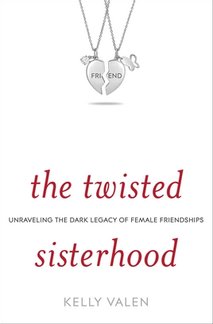
29 Oct 2010 02:34:47
Kelly Valen in the introduction to "The Twisted Sisterhood," a book that tackles a recognized but oft-unspoken truth about female friendships: that while women cherish their friendships, there is also frequently an undercurrent of destructiveness.
"Twisted Sisterhood" is a thorough, well-researched, earnest look at how women might stop turning away from one another. Valen covers mother-daughter relationships, friendships and work relationships, offering evenhanded advice bolstered by psychological and academic texts. Of particular concern to Valen are mother-daughter bonds, posited as a crucial part of healing and avoiding either inflicting or suffering from the emotional scars that women are especially capable of causing.
The book elaborates on an issue Valen first wrote about in a 2007 New York Times' Modern Love column, in which she described her inability to feel close to other women, which she dated back to college, when her sorority sisters failed to support her after she'd been raped at a fraternity function.
While she received a number of harsh criticisms and critiques from female readers, other women wrote to share their own emotionally damaging experiences at the hands of other women.
"It seems we've conditioned ourselves to deny, discount, and just plain swallow our intrafemale hurts as something we shouldn't indulge or whine about," Valen writes, and the fact that airing legitimate grievances or concerns would be seen as whining is telling in itself.
Valen surveyed over 3,000 women — the questionnaire is in an appendix — gathering as much data from as wide a cross-section as possible. The questions range from whether one finds their female friendships "authentic" and "reliable" to whether one had ever experienced "any type of lasting distress, pain, trauma, or emotional scarring" stemming from a negative experience with a woman or group of women. While these questions may be leading, many respondents answered yes, and Valen reproduces a number of stories that sound heartbreakingly familiar.
"Twisted Sister" is worth reading, with one caveat: Valen seems uncomfortable with feminist politics, which she raises in a later section of the book that argues women should stop blaming men for their own infighting.
Feminism is defined as simply "blaming the patriarchy," which Valen tends to conflate with "blaming men," when pointing the finger at individuals isn't at all the same thing as pointing to an ideological framework that systematically and institutionally values men over women — an idea that is then curiously absent from her discussion of work-related intrafemale fighting and the negative stereotypes of female relationships perpetrated by TV programs and movies.
Valen goes so far as to question whether 21st-century women even need the "feminist" label, and for those women who would answer such a question with a resounding "yes," the ideas in this section will not at all jibe with the rest of her book, in which Valen is clearly making a feminist argument: that the sisterhood is powerful and can be more powerful still if all women everywhere took more care with each other.
"Twisted Sisterhood" is a thorough, well-researched, earnest look at how women might stop turning away from one another. Valen covers mother-daughter relationships, friendships and work relationships, offering evenhanded advice bolstered by psychological and academic texts. Of particular concern to Valen are mother-daughter bonds, posited as a crucial part of healing and avoiding either inflicting or suffering from the emotional scars that women are especially capable of causing.
The book elaborates on an issue Valen first wrote about in a 2007 New York Times' Modern Love column, in which she described her inability to feel close to other women, which she dated back to college, when her sorority sisters failed to support her after she'd been raped at a fraternity function.
While she received a number of harsh criticisms and critiques from female readers, other women wrote to share their own emotionally damaging experiences at the hands of other women.
"It seems we've conditioned ourselves to deny, discount, and just plain swallow our intrafemale hurts as something we shouldn't indulge or whine about," Valen writes, and the fact that airing legitimate grievances or concerns would be seen as whining is telling in itself.
Valen surveyed over 3,000 women — the questionnaire is in an appendix — gathering as much data from as wide a cross-section as possible. The questions range from whether one finds their female friendships "authentic" and "reliable" to whether one had ever experienced "any type of lasting distress, pain, trauma, or emotional scarring" stemming from a negative experience with a woman or group of women. While these questions may be leading, many respondents answered yes, and Valen reproduces a number of stories that sound heartbreakingly familiar.
"Twisted Sister" is worth reading, with one caveat: Valen seems uncomfortable with feminist politics, which she raises in a later section of the book that argues women should stop blaming men for their own infighting.
Feminism is defined as simply "blaming the patriarchy," which Valen tends to conflate with "blaming men," when pointing the finger at individuals isn't at all the same thing as pointing to an ideological framework that systematically and institutionally values men over women — an idea that is then curiously absent from her discussion of work-related intrafemale fighting and the negative stereotypes of female relationships perpetrated by TV programs and movies.
Valen goes so far as to question whether 21st-century women even need the "feminist" label, and for those women who would answer such a question with a resounding "yes," the ideas in this section will not at all jibe with the rest of her book, in which Valen is clearly making a feminist argument: that the sisterhood is powerful and can be more powerful still if all women everywhere took more care with each other.

